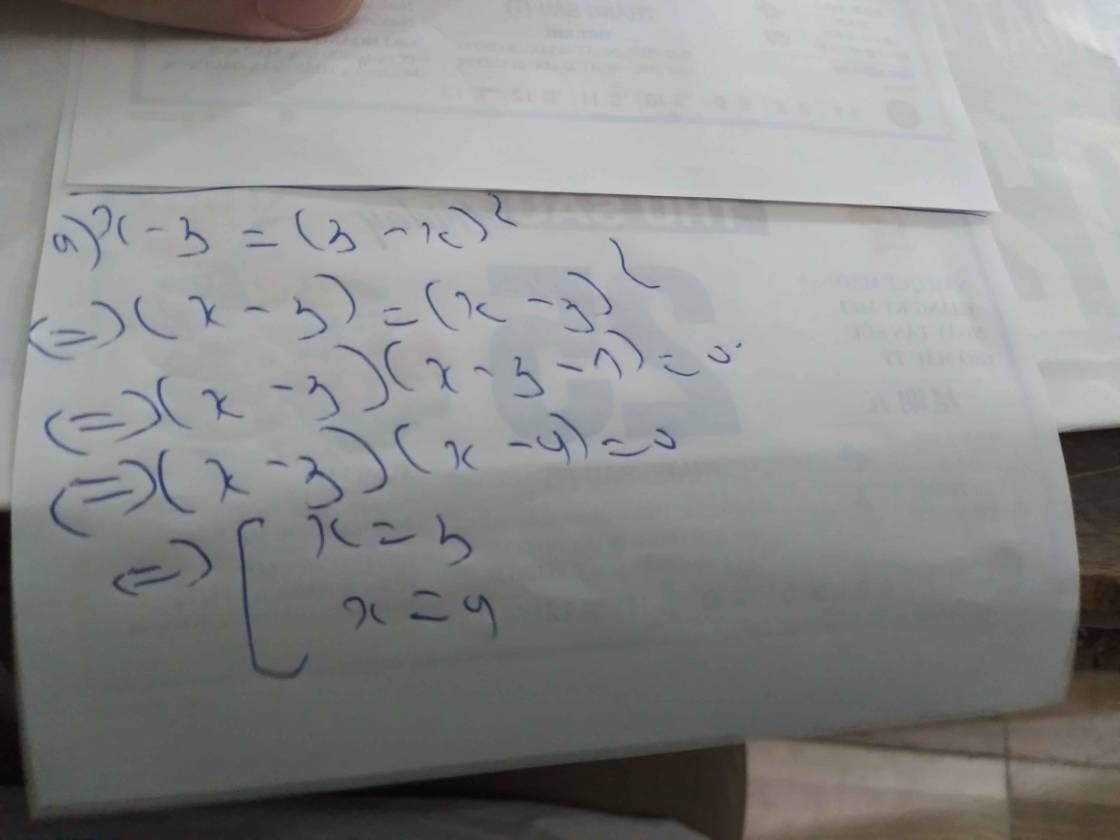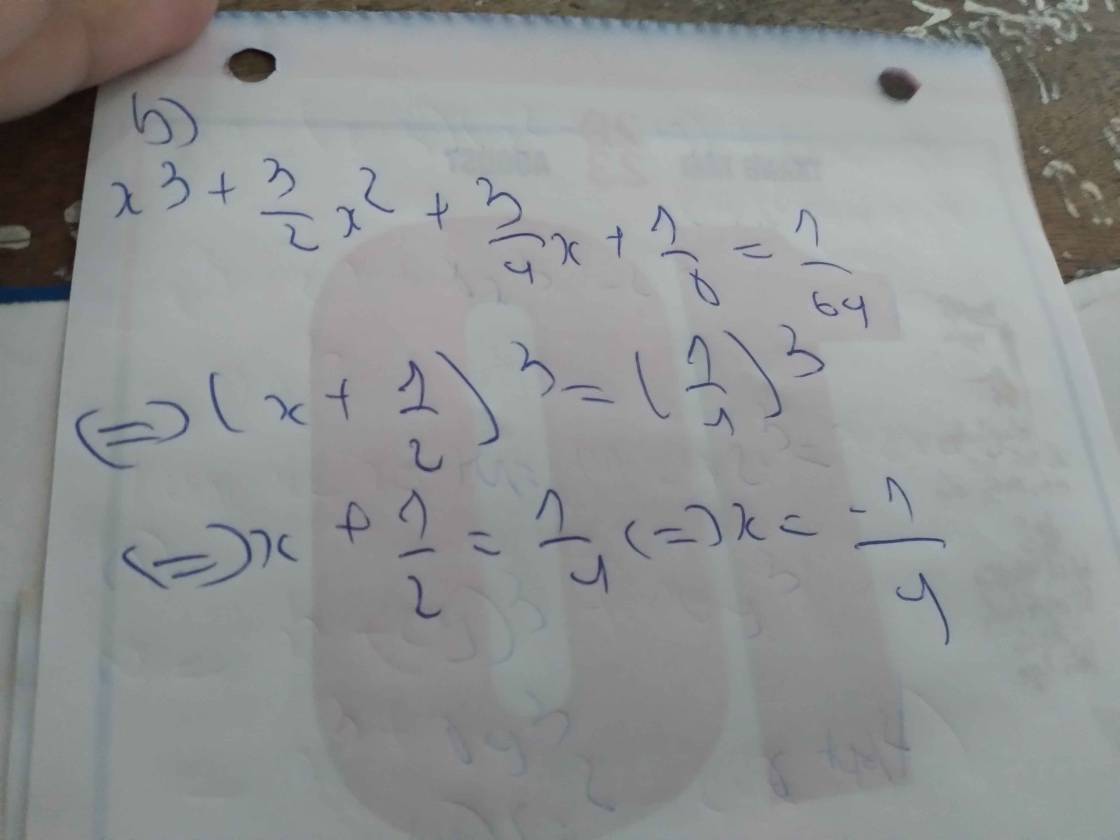Tìm x biếtx^2+4x^2/(x-2)^2=5

Những câu hỏi liên quan
tìm x biết
x-3=(3-x)^2
x^3+3/2x^2+3/4x+1/8=1/64
\(\left(x-3\right)=\left(3-x\right)^2\)
\(\Leftrightarrow x-3=\left(x-3\right)^2\)
\(\Leftrightarrow\left(x-3\right)-\left(x-3\right)^2=0\)
\(\Leftrightarrow\left(x-3\right)\left[1-\left(x-3\right)\right]=0\)
\(\Leftrightarrow\left(x-3\right)\left(4-x\right)=0\)
\(\Leftrightarrow\left[{}\begin{matrix}x-3=0\\4-x=0\end{matrix}\right.\)
\(\Leftrightarrow\left[{}\begin{matrix}x=3\\x=4\end{matrix}\right.\)
___________
\(x^3+\dfrac{3}{2}x^2+\dfrac{3}{4}x+\dfrac{1}{8}=\dfrac{1}{64}\)
\(\Leftrightarrow x^3+3\cdot\dfrac{1}{2}\cdot x^2+3\cdot\left(\dfrac{1}{2}\right)^2\cdot x+\left(\dfrac{1}{2}\right)^3=\dfrac{1}{64}\)
\(\Leftrightarrow\left(x+\dfrac{1}{2}\right)^3=\left(\dfrac{1}{4}\right)^3\)
\(\Leftrightarrow x+\dfrac{1}{2}=\dfrac{1}{4}\)
\(\Leftrightarrow x=\dfrac{1}{4}-\dfrac{1}{2}\)
\(\Leftrightarrow x=-\dfrac{1}{4}\)
Đúng 2
Bình luận (0)
Tìm X biết
X^2/20 = 4/5
\(\dfrac{x^2}{20}=\dfrac{4}{5}\)
\(\Leftrightarrow x^2=16\)
hay \(x\in\left\{4;-4\right\}\)
Đúng 1
Bình luận (0)
tìm 𝑥 biết
x+2/7=-49/(x+2)^2
\(\Leftrightarrow\left(x+2\right)^3=343\)
=>x+2=7
hay x=5
Đúng 0
Bình luận (0)
Tìm x biết
x^2-3x^2+3x-1=-8
\(x^3-3x^2+3x-1=-8\)
\(\Leftrightarrow x-1=-2\)
hay x=-1
Đúng 0
Bình luận (1)
Tìm số nguyên x biết
x-1/8= 4/x-2
\(x-\dfrac{1}{8}=\dfrac{4}{x-2}\) hay \(x-\dfrac{1}{8}=\dfrac{4}{x}-2\) vậy bạn?
Đúng 2
Bình luận (0)
\(\dfrac{x-1}{8}=\dfrac{4}{x-2}\)
=>\(\dfrac{\left(x-1\right)\left(x-2\right)}{8.\left(x-2\right)}=\dfrac{4.8}{\left(x-2\right).8}\)
=>khử mẫu
=>(x-1)(x-2)=32
.......
Đúng 1
Bình luận (2)
Tìm x,y thuộc Z biết
x^2-2x+2^2y-2^y+3+17=0
Tìm x,y thuộc Z biết
x^2-2x+2^2y-2^y+3+17=0
tìm 2 số x và y biết
x phần 3 = x cộng y = 20
\(\dfrac{x}{3}=x+y=20\Rightarrow x=60\Rightarrow60+y=20\Rightarrow y=-40\)
Đúng 3
Bình luận (0)
Ta có:
\(\dfrac{x}{3}=20\)
\(\Rightarrow\)\(x=60\)
Lại có:
\(x+y=20\)
\(\Rightarrow\)\(y=20-60\)
\(\Rightarrow\)\(y=-40\)
Vây x = 60 và y = - 40
Đúng 0
Bình luận (0)
\(\dfrac{x}{3}=x+y\)
\(\Leftrightarrow x-\dfrac{1}{3}x=-y\)
\(\Leftrightarrow y=-\dfrac{2}{3}x\)
Ta có: x+y=20
\(\Leftrightarrow x\cdot\dfrac{1}{3}=20\)
hay x=60
=> y=40
Đúng 1
Bình luận (0)
Xem thêm câu trả lời
Tìm x,y biết
x/2=y/3 và 2x-3y=54
áp dụng tính chất dãy tỉ số bằng nhau ta có:
\(\dfrac{x}{2}=\dfrac{y}{3}=\dfrac{2x}{4}=\dfrac{3y}{9}=\dfrac{2x-3y}{4-9}=-\dfrac{54}{5}\)
\(\dfrac{x}{2}=-\dfrac{54}{5}\Rightarrow x=-\dfrac{54}{5}.2=-\dfrac{108}{5}\)
\(\dfrac{y}{3}=-\dfrac{54}{5}\Rightarrow y=-\dfrac{54}{5}.3=-\dfrac{162}{5}\)
Vậy \(x=-\dfrac{108}{5};y=-\dfrac{162}{5}\)
Đúng 3
Bình luận (0)
Ta có: \(\dfrac{x}{2}=\dfrac{y}{3}\)
nên \(\dfrac{2x}{4}=\dfrac{3y}{9}\)
mà 2x-3y=54
nên Áp dụng tính chất của dãy tỉ số bằng nhau, ta được:
\(\dfrac{2x}{4}=\dfrac{3y}{9}=\dfrac{2x-3y}{4-9}=\dfrac{-54}{5}\)
Do đó: \(x=-\dfrac{108}{5};y=-\dfrac{162}{5}\)
Đúng 0
Bình luận (0)
























